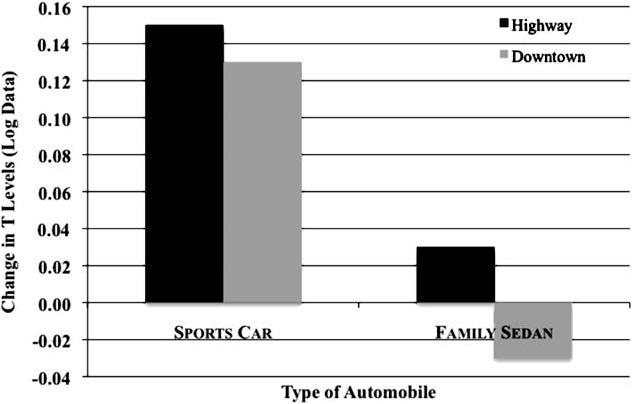A couple weeks back, I put up a post on Testosterone Levels, Top Dogs,and Collective Confidence, which described a study showing that groups enjoyed more collective confidence when the people with higher levels where at the top of the pecking order and those with lower levels are at the bottom (compared to "mismatched groups" where the top dogs had low levels and the underlings had high levels). There were some extremely thoughtful comments on that post, including a comment that "T" levels, as researchers call them, are heavily influenced by situational factors. Well, to that point, it turns out that — as I learned from the always useful BPS Research Digest – that this article was one of a set published in a special issue of Organizational Behavior and Decision Processes on "The Biological Basis of Business." I read through the table of contents for the issue, and came upon a study that just cracked me up on the effects of driving a Porsche vs. a Camry.
It is called "The Effects of Conspicuous Consumption on Men's Testosterone Levels" and was conducted by Gad Saad and John Vongas of Concordia University. Here is roughly what they did (I am focusing on the first of the two studies in the article). They had 39 young heterosexual men drive both "a 2006 Porsche 911 Carrera 4S Cabriolet estimated to be worth over $150,000" and a "a dilapidated 1990 Toyota Camry wagon having over 186,000 miles," each for an hour,split evenly between city and and highway driving. They randomly assigned subjects to driving either the Porsche or Camry first. They took a total of six "T" samples from each young man at various stages on the process. Most crucial for our purposes are the changes in "T" that occurred after driving the Porsche vs. the Camry, but also relevant are the two "baseline" samples taken before and after the experience.
The effect was that driving the Camry did not seem to lead in a significant change in T levels, but — no doubt to the delight of many people and perhaps the disgust of many others — the young guys who drove the Porsche experienced significant and substantial increases in T levels after driving the Porsche (in the final sample of 31 guys, 8 were excluded from the day analysis because their samples were tainted by excessive excessive blood in their mouths).
Here is the key table:
I am not sure if these results are completely obvious and trivial or completely shocking and crucial. I always had a sneaking suspicion that the "manly" feeling that comes from driving a sports car was nonsense promoted by car companies. But I guess it may have some truth. Also, I want to commend the researchers for demonstrating a lot of creativity and for — despite the straight and serious academic writing — producing one of the most entertaining academic studies I have read in a long time.
P.S. Here is the citation: G. Saad, J.G. Vongas / Organizational Behavior and Human Decision Processes 110 (2009) 80–92
